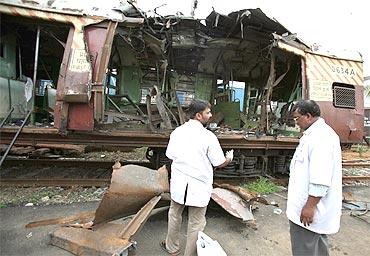 The 'record speed' with which the 26/11 probe was conducted may have set a precedent for future terror cases, but what about the July 2006 train blasts which killed 187 persons travelling in local trains of Mumbai?
The 'record speed' with which the 26/11 probe was conducted may have set a precedent for future terror cases, but what about the July 2006 train blasts which killed 187 persons travelling in local trains of Mumbai?
Even four years after the horrific incident orchestrated by the Lashkar-e-Tayiba, the case is in the trial stages.
The delays started right from the beginning. The chargesheet took a whole year to be filed. On August 7, 2007, a year and one month after the incident, the Mumbai police filed a detailed chargesheet listing out 800 different charges against 28 persons, of which 13 were in custody, while the remaining were absconding.
However, the trial did not commence immediately after the chargesheet was filed. The lawyers of some of the accused expressed unhappiness with the Maharashtra Control of Organised Crime Act court judge Madhur Bhatkar, and sought a transfer of the case to another court.
Before hearing their plea, there was a bit of drama in the court with one of the accused, Mohammad Majid, saying that he needed an Urdu translator as he did not understand Hindi.
Shortly after this when the judge was about give a date to frame the charges, all the accused told the court that they wanted to withdraw their lawyers, which contributed to more delay. The court then put off the matter by another week, giving the accused time to change lawyers, and also seek transfer of the case to another court.
Those were early days and were plagued by delays. However, after a couple of months, the case was placed before the court of MCOCA judge D Y Shinde, who started hearing the matter. An application by one of the accused Sadiq Sheikh was filed in which he had claimed that he was framed by the Mumbai police.
The Anti Terrorism Squad too filed an application in the court stating that they had found no evidence against Sadiq, and this paved the way for his discharge from the case.
This was followed by another application, this time under the Right to Information Act. One of the accused, Abdul Wahiuddin, sought details from the investigating agency as to how long would it take for the trial to commence or be completed.
He also stated in his application that he would like to travel to Delhi to pursue his application. He filed the same before the court. While the ATS did not object on the condition that he would have to bear his own expenses, the court, however, rejected his plea to travel to Delhi.
Ironically, in all these days, the court managed to examine just one witness in the case, thanks to the fact that numerous applications aimed at delaying the trial were filed.
However, the major setback for the trial came when an application was filed before the Bombay high court challenging the application of MCOCA in the case. The Bombay HC, which heard the matter, dismissed the petition paving the way for an appeal before the Supreme Court.
At the Supreme Court, the matter came up before a division bench, and the bench felt that since the very provisions under which the trial is being conducted is under challenge, it would be fair to stay the trial until final orders were passed. On February 29, 2009, the apex court stayed the trial.
The matter came up for orders finally on April 23, 2010, whne the SC set aside the plea of the accused that MCOCA was 'unconstitutional' and ordered that the trial could go on.
With the green signal from the SC, all decks have been cleared for the trial to commence. A source in the ATS told rediff.com that there should be no problem now. The trial will commence on May 21. There is still a long way to go and the summoning of the witnesses should start by the end of this month.
"On May 21, our prosecutor will place before the court the verdict of the Supreme Court," the source also pointed out.
The main players:
- Faisal Shaikh: Alleged to be the Let chief in Mumbai. He is the prime accused, charged with getting hawala money to execute the blasts. Apart from this, he hosted the accused at his house, apart from holding conspiracy meetings.
- Asif Khan Bashir Khan: Gave shelter to the terrorists and also helped assemble the bombs.
- Mohammed Ali: Students Islamic Movement of India member, who helped assemble the bombs.
- Majid Mohammed Shafi: Resident of Kolkata, who allegedly helped terrorists from across the border smuggle in RDX.
- Sajid Margub Ansari: Sheltered the terrorists and also procured the timer devices used in the bombs.
- Kamal Ansari: Helped terrorists infiltrate.
- Ehteshaam Siddiqui: Harboured Pakistani terrorists; surveyed local trains and also planted the bomb which exploded at the Mira Road station.
- Zameer Shaikh: Surveyed local trains.
- Sohail Shaikh: Surveyed local trains
- Muzammil Shaikh: Faisal's brother, who helped in procuring hawala money to execute the blasts.
- Dr Tanvir Ansari: Helped assemble bombs
- Naveed Hussain: Helped assemble bombs
- Abdul Wahid Din Shaikh: Rented a house where Pakistani terrorists Ammu Jan, Sabir, Abu Bakr, Kasam Ali, Ehsahnullah and Abu Hasan lived.
While these are the men who would face the trial, there are 15 others, including the deadly Azam Cheema, who are still absconding. Cheema is said to be the mastermind and his role in the 26/11 attacks too had come under scrutiny. The intelligence agencies believe that he is presently in the United Kingdom, and the Interpol too has been sounded off regarding the same.
Image: Forensic officers examine a damaged railway train compartment hit by bomb blast in Mumbai
Photograph: Punit Paranjpe / Reuters
on July 12, 2006.






 © 2025
© 2025